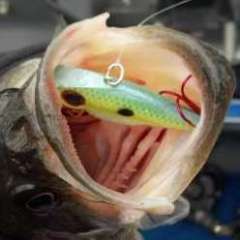At the end of August, the HOA did a weed abatement program on my home lake via some kind of chemical dump. The fishing slowed for a week & then went back to normal until the beginning of October. However, since the start of October, fishing has really slowed & my catch rates have been off well over 50% (compared to previous years). It has me scratching my head as to what is occurring, so I thought I would lay out the details and see if anything like this has ever happened on your home body of water.
As a background, my lake is a small 100 acre development reservoir completely surrounded by homes. It is bowl shaped with a retaining wall completely around the lake, with depths ranging from 2 feet to 12 feet out in the middle. The coves are shallower (7 to 9 feet max) and with the vegetation now gone, the predominant cover is the hundreds of boat docks. Prior to the weed killing, there were weedlines in 3 to 7 feet of water both in the main lake & in the coves. These weedlines are now gone, as are also the few lily pads near a couple of peoples docks and a few Christmas trees I had sunk over the years (I don't know if the chemical disintegrated them or if they have just rotted away on their own). There are multiple "bubblers" throughout the lake, helping keep the water oxygenated and moving. Boat traffic is limited to electric boats, paddleboats & kayaks. Water temps get as high as 85 degrees in the summer and as low as 54 in the winter. The lake is inhabited by bass, bluegill, green sunfish, channel catfish, carp & some various minnows.
What is puzzling to me is comparing what has changed as to what has stayed the same. As before the treatment, there are still thousands of bream fry & small minnows living tight up against seawall (in the undercuts & broken portions). The bass I have been catching are still healthy, not only in appearance but in fight. There has been no change in fishing pressure (I am it for all intents & purposes) and the other wildlife around the lake seem to be acting the same. The coots are still eating moss from the bottom of the lake & the Canada geese are still using the lake as a stop over during their migration south.
In addition to the eradication of the vegetation, the only other difference from the past few years has been a pair of cormorants that have taken up residence here (despite my efforts to chase them off). They have been here for about 9 months and look big enough to eat a 10" bass. I don't know if the lack of weedbeds helps the cormorants catch fish and I am not sure how many fish these two are eating. The presence of the cormorants may have changed the basses behavior and where they choose to live, but I can't be sure since the weed kill was done not long after the birds arrival.
In past years before the weedlines grew, the basic behavior of the bass was to cruise the shorelines during low light times and take cover under docks or in deeper water (often near the bubblers) during brighter times. This altered a little when the weedlines grew, as many of the fish would cruise the weedlines instead of the shore & would hole up in the weeds during the middle of non-cloudy days. Now I don't have much of a clue what they are doing. There are almost no fish under any docks at any time. The deeper areas have no fish that I catch or see on my depthfinder. This is all opposite of my experiences during the same time of year over the past decade. Further, this goes for the larger catfish & bluegill that used to occasionally intercept my offerings as well, I have found next to none of them.
My only theory is that this major change in habitat in such a short time may be causing the forage & predators to suspend out over the deeper areas of the lake like a more pelagic kind of fish. The bass are obviously eating, because those caught are healthy & there has been no evidence of a fish kill. I haven't seen any suspending activity, but since the lake is so shallow, I don't think I could meter over them if they were suspending without spooking them. I am kind of hoping that when the prespawn starts in about 6 weeks, it resets the lake and the fish get back into being able to be patterned.
So back to my question - Has anyone else ever experienced a body of water changing this fast and if so, what did you figure out was going on?











